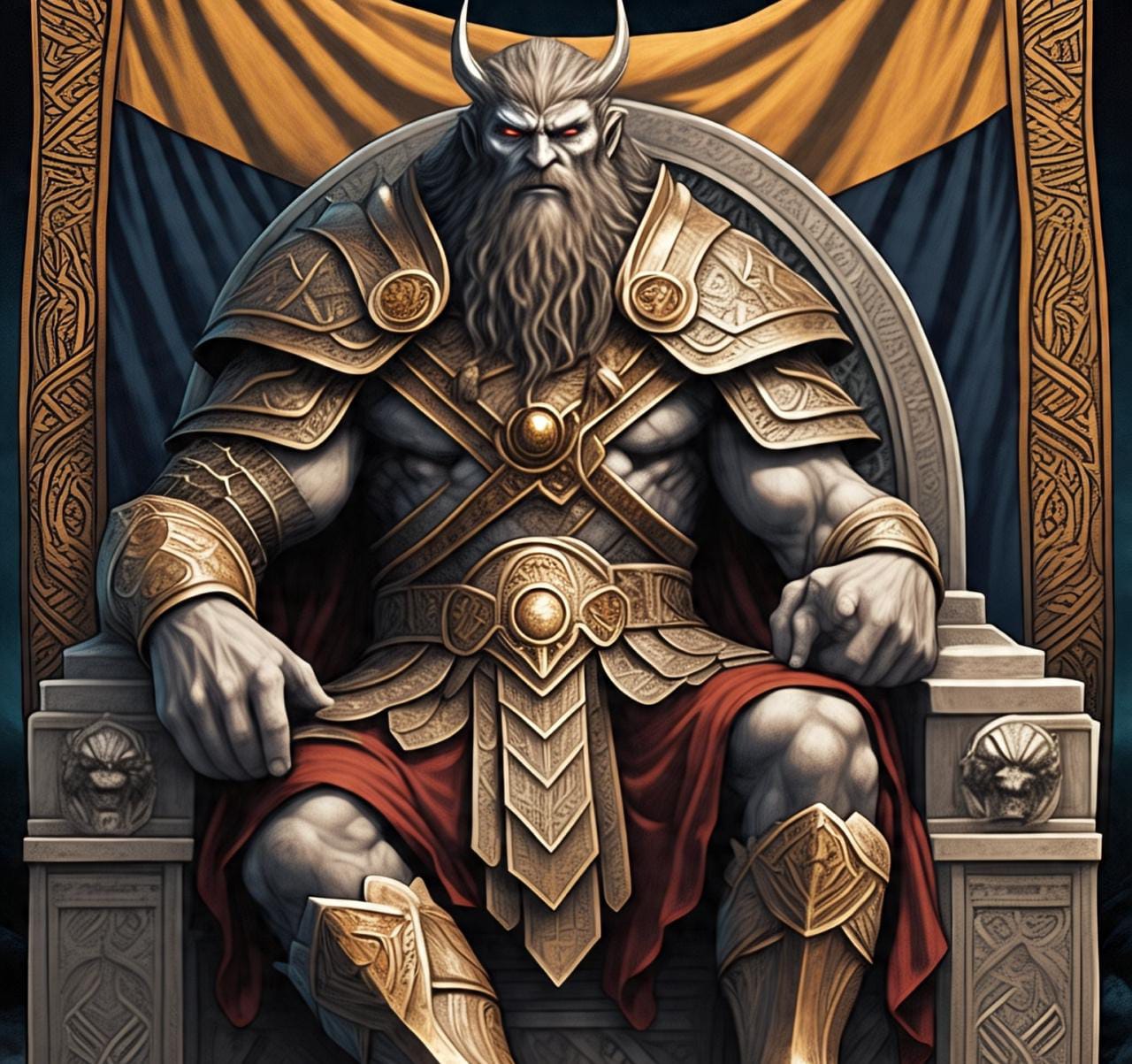The Jotun Who Claimed Asgard's Throne

A long time ago, in the magical world of Norse mythology, the mighty gods of Asgard lived in golden halls, ruled by wise Odin and protected by thunderous Thor. Their land stood tall above the other realms, shining like a star in the sky.
But not all who looked up at Asgard admired it with love. Some looked with envy—and one of them was a clever and bold Jotun, a giant from the land of Jotunheim.
This is the tale of Skarnir, the jotun who dared to do the impossible—claim the throne of Asgard.
A Giant With Big Plans
Skarnir wasn’t like other giants. Most Jotuns loved chaos and smashing things. But Skarnir was different. He was clever, quiet, and curious. He had studied the gods from afar and dreamed of what it would be like to sit on Odin’s great throne—Hlidskjalf, the seat from which Odin could see all nine worlds.
“Why should gods rule forever?” Skarnir muttered one night. “Why not a jotun with a sharp mind?”
That was when his plan began.
Disguised in Gold
Skarnir knew he couldn’t storm into Asgard with strength alone. So he used magic instead. He crafted a shimmering disguise—a tall, noble figure with golden hair and kind eyes. He called himself Serin, and claimed to be a traveler from a distant realm seeking wisdom and peace.
The gods welcomed him politely. Even Odin, who could usually see through trickery, was curious about this newcomer.
Serin spoke gently, helped with tasks, and even told stories that made the gods laugh. Only Loki, the trickster, gave him suspicious looks.
But Skarnir was careful. Very careful.
A Throne Left Empty
One day, Odin left Asgard to seek answers from the Well of Wisdom. While he was gone, a strange illness swept through the golden halls. Thor was out chasing trolls, Frey was lost in dreams, and even Heimdall, the watchman, had a sleepy spell fall over him.
Only Serin—Skarnir in disguise—remained awake.
And so, he climbed the steps of Hlidskjalf and sat on the throne of Asgard.
Suddenly, everything changed. The throne showed him visions of all the worlds, of secrets and stars, of paths only Odin had ever seen.
“I could rule,” Skarnir whispered. “I could bring order… my way.”
The Return of Odin
But just as Skarnir began to enjoy his power, Odin returned—his single eye glowing like a storm.
“You sit on what is not yours,” Odin said calmly. “Do you know what that means?”
Skarnir stood tall. “I am not your enemy, All-Father. I only wish to rule wisely. The gods grow lazy while Jotunheim crumbles. I could do better.”
Odin’s face was quiet, then stern. “No throne is claimed through lies.”
The Trial of Truth
Instead of striking Skarnir down, Odin surprised everyone. He called a trial—not of swords, but of truth.
Each god would ask Skarnir a question. If he answered all with honesty and wisdom, Odin would let him leave in peace. If not, he would be banished forever.
Skarnir answered questions from Freyja, from Tyr, even from Frigg. He spoke of justice, of balance, and of courage.
But then came a question from little Baldur, the shining god.
“If you truly want peace… why did you come in disguise?”
Skarnir paused.
And he bowed his head. “Because I didn’t believe the gods would listen to a giant. I was wrong.”
A New Path
Odin stood and said, “Skarnir, you are clever and brave—but a throne cannot be taken. It must be earned, with trust and truth.”
Skarnir removed his disguise. The gods watched as his tall, frost-marked form stood in the golden light—not as a trickster, but as a thinker.
Odin did not banish him.
Instead, he offered Skarnir a place—not on the throne, but as a watcher of the borders, a voice between Asgard and Jotunheim.
Skarnir accepted.
And though he never sat on the throne again, he became known as the Bridge-Keeper, the giant who once reached for the stars—and found something even greater.
Moral of the Story:
True strength is not in taking power, but in speaking truth. Even giants can be wise, and even rulers must be humble.